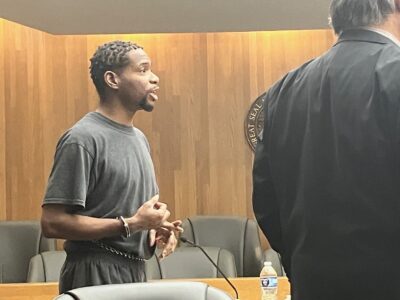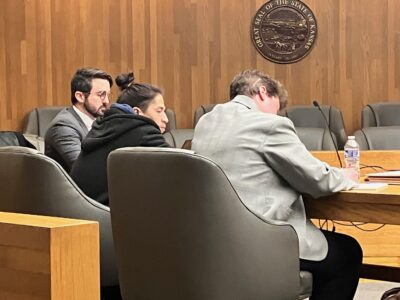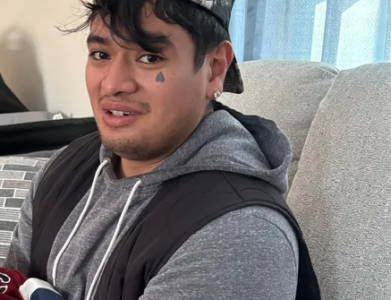Lawrence man sentenced to 31 months in prison for killing 20-year-old

photo by: Kim Callahan/Journal-World
Maliqe Crenshaw is pictured with his attorney, Jessica Glendening, Friday, Sept. 27, 2024, in Douglas County District Court.
Updated at 6:09 p.m. Friday, Sept. 27
A Lawrence man was sentenced Friday to 31 months in prison for involuntary manslaughter in connection with a 2023 shooting that killed a Topeka man.
The man, Maliqe Crenshaw, 23, was originally charged with one felony count of second-degree murder in connection with the death of 20-year-old Cameron Renner on June 3, 2023, around 1 a.m. in the 2400 block of Cedarwood Drive, as the Journal-World reported.
However, Crenshaw, in a July 23 deal with the state, was allowed to plead no contest to involuntary manslaughter. In exchange, the state dismissed two cases of domestic violence against Crenshaw and agreed to not charge two others.
Crenshaw and Renner didn’t know each other, by all accounts, but had become enmeshed in a feud between other men. As the Journal-World reported, the feud escalated to various taunts being made, a firework being thrown in the vicinity of Crenshaw’s residence, and Crenshaw, who was outside at the time, reacting by pulling his gun and firing, inadvertently killing Renner.
He didn’t aim at anyone in particular, Deputy District Attorney David Greenwald emphasized Friday. “He just started shooting.”
At the sentencing, the mother and grandmother of Renner, both in tears and wearing “Justice for Cameron” T-shirts, expressed their grief and beseeched Judge Stacey Donovan to “do the right thing” and give Crenshaw the maximum allowable sentence.
“You robbed my son of his life,” Katie Paine told Crenshaw, shaking and sobbing. “He never even got to celebrate his 21st birthday.”
Renner’s grandmother, Leslie Paine, said her grandson had unwittingly been pulled into the feud between his cousin and a friend of Crenshaw and had ended up dying as a result. She said Renner had been at her house just prior to the shooting, “on a beautiful night,” eating a bowl of ice cream, when his cousin, Dawson Paine, asked him to leave with him.
She said Renner did leave, believing he’d be back so soon that he didn’t even bother to bring his wallet or phone. But she never saw him again.
Renner’s body wasn’t immediately identified at the hospital, where Crenshaw himself had taken him, because Renner didn’t have his wallet and Crenshaw didn’t know who he was.
Crenshaw’s mother, who came to Lawrence from Baltimore with several other relatives, also spoke at the sentencing Friday, apologizing to Renner’s family and asking the judge to show mercy on her son for his involvement in the “tragedy.” She said her son had experienced a traumatic childhood, including being severely bullied and having witnessed her being beaten. She said that his inability to help her in that situation haunted him and that as a result he had developed a troubled reaction to threats of violence — for example, not understanding that it wasn’t cowardly to just walk away.
Crenshaw himself also tearfully addressed the court, expressing “remorse and regret.” He said he understood the “severity of someone passing away” and acknowledged that his pain could not compare to that of Renner’s family.
He said that he had bought his gun legally for protection and that after seeing a Facetime video with an armed threat toward him, and other taunts, he assumed that the men who came to him that night were all armed.
“I never had an intended target,” he said about firing his gun. “I didn’t know any of them. I just didn’t want any of my friends or me to get hurt.”
After the shooting, Crenshaw reportedly said, “God forgive me, I think I hit him,” according to testimony from a previous hearing, which Donovan mentioned before passing sentence Friday.
Donovan also noted that Crenshaw had sincerely tried to save Renner’s life by calling 911 and by driving him to the hospital, which she noted was “unusual” in the gun violence cases she had dealt with.
His attempt to render aid, his immediate remorse and his acceptance of responsibility, among other things, were all possible reasons to depart from the sentencing guidelines and allow probation, as defense attorney Jessica Glendening had requested, but in the end Donovan opted for the lowest, or “mitigated,” prison term for involuntary manslaughter instead. Crenshaw could have faced as much as 34 months, but Donovan ordered 31.
“What the court cannot get past,” she said, “is that the weapon was pulled and the weapon was used” when there were other options for evading the perceived threat from the men.
A law in Kansas, known as Special Rule 1, presumes a prison sentence if a defendant uses a firearm in commission of a person felony, which Greenwald and Donovan both noted.
Glendening nevertheless had argued that Crenshaw and the community would be better served if Crenshaw were to get mental health treatment rather than going to prison, but Greenwald was sharply critical of that, arguing that no plan more specific than “therapy” had been set forth — a criticism with which the court apparently agreed.
Greenwald was also highly critical of a witness called by the defense, clinical psychologist Gregory Nawalanic, who testified that Crenshaw was unlikely to reoffend and that a treatment option would be better than prison. Nawalanic said that Crenshaw had lived a life steeped in violence, including getting shot, but that he essentially wasn’t responsible for any of it.
“None of it was his fault?” Greenwald asked incredulously, noting that Nawalanic had not reviewed the police reports or camera footage in the case or even questioned Crenshaw about the circumstances of having been shot himself. Nawalanic, who said he didn’t want to retraumatize Crenshaw, had simply taken everything Crenshaw represented to him at face value, Greenwald told the court, arguing that Nawalanic wouldn’t concede that prison was appropriate for anyone except the most heinous serial killers and rapists.
Crenshaw has been in jail for 318 days, and that time will be credited toward his sentence.
Dawson Paine, Renner’s cousin, is currently facing a charge of second-degree murder in the March 5 shooting death of 18-year-old Davin Kerr, of Lawrence, as the Journal-World reported.







